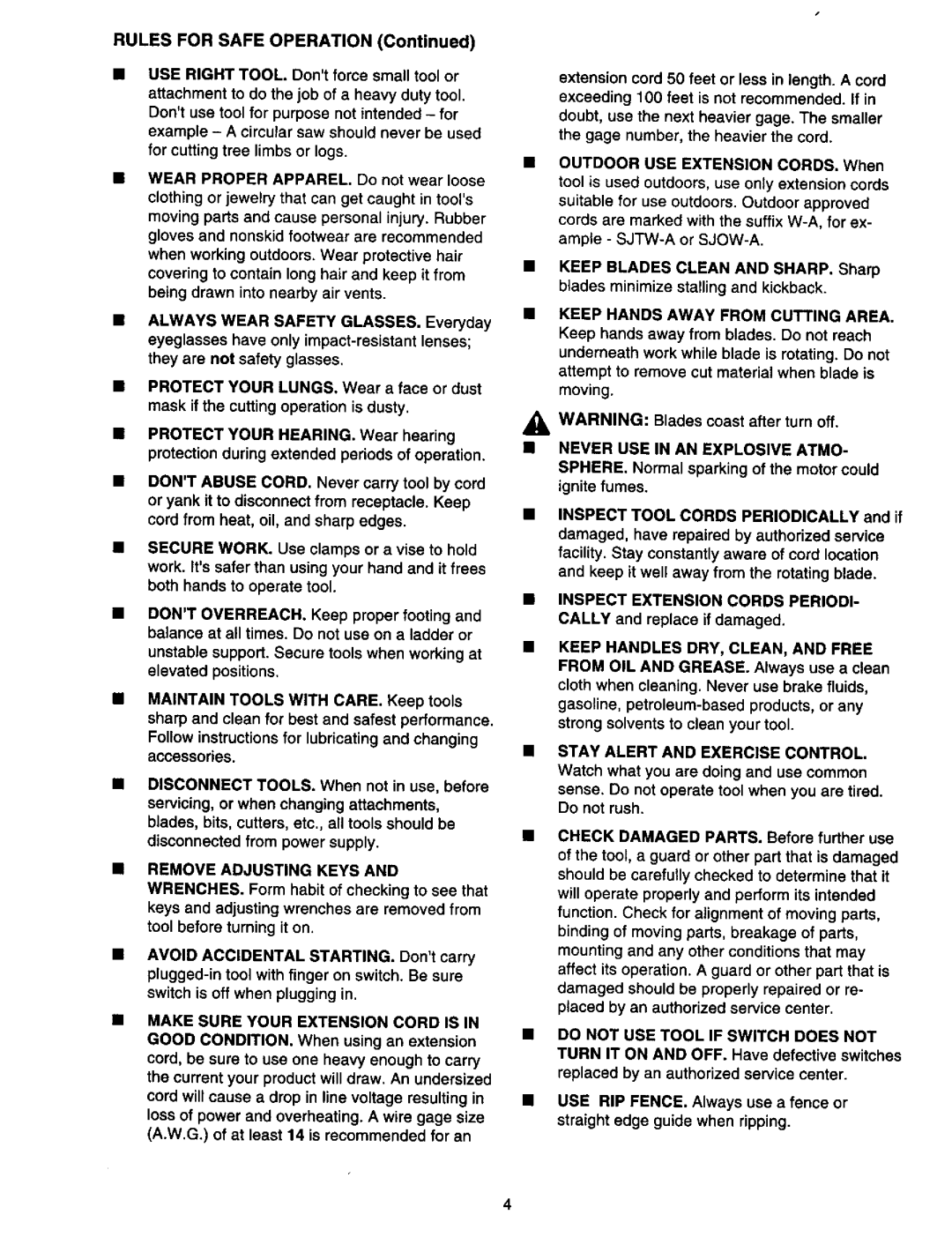
RULES FOR SAFE OPERATION (Continued)
USE RIGHT TOOL. Don'tforce small tool or
attachment to do the job of a heavy duty tool. Don'tuse tool for purpose not intended - for example - A circular saw should never be used for cutting tree limbs or logs.
WEAR PROPER APPAREL. Do not wear loose clothing or jewelry that can get caught in tool's moving parts and cause personal injury. Rubber gloves and nonskid footwear are recommended when working outdoors. Wear protective hair covering to contain long hair and keep it from being drawn into nearby air vents.
ALWAYS WEAR SAFETY GLASSES. Everyday eyeglasses have only
PROTECT YOUR LUNGS. Wear a face or dust mask if the cutting operation is dusty.
PROTECT YOUR HEARING. Wear hearing protection during extended periods of operation.
DON'TABUSE CORD. Never carry tool by cord or yank it to disconnect from receptacle. Keep cord from heat, oil, and sharp edges.
SECURE WORK. Use clamps or a vise to hold work. It'ssafer than using your hand and it frees both hands to operate tool.
DON'T OVERREACH. Keep proper footing and balance at all times. Do not use on a ladder or
unstable support. Secure tools when working at elevated positions.
MAINTAIN TOOLS WITH CARE. Keep tools sharp and clean for best and safest performance.
Follow instructions for lubricating and changing accessories.
DISCONNECT TOOLS. When not in use, before servicing, or when changing attachments, blades, bits, cutters, etc., all tools should be disconnected from power supply.
REMOVE ADJUSTING KEYS AND
WRENCHES. Form habit of checking to see that keys and adjusting wrenches are removed from tool before turning it on.
AVOID ACCIDENTAL STARTING. Don'tcarry
MAKE SURE YOUR EXTENSION CORD IS IN GOOD CONDITION. When using an extension cord, be sure to use one heavy enough to carry the current your product will draw. An undersized cord will cause a drop in line voltage resulting in loss of power and overheating. A wire gage size (A.W.G.) of at least 14 is recommended for an
extension cord 50 feet or less in length. A cord exceeding 100 feet is not recommended. If in doubt, use the next heavier gage. The smaller the gage number, the heavier the cord.
OUTDOOR USE EXTENSION CORDS. When tool is used outdoors, use only extension cords suitable for use outdoors. Outdoor approved cords are marked with the suffix
KEEP BLADES CLEAN AND SHARP. Sharp blades minimize stalling and kickback.
KEEP HANDS AWAY FROM CUTTING AREA. Keep hands away from blades. Do not reach underneath work while blade is rotating. Do not attempt to remove cut material when blade is moving.
WARNING: Blades coast after turn off.
•NEVER USE IN AN EXPLOSIVE ATMO- SPHERE. Normal sparking of the motor could ignite fumes.
INSPECT TOOL CORDS PERIODICALLY and if damaged, have repaired by authorized service facility. Stay constantly aware of cord location and keep it well away from the rotating blade.
INSPECT EXTENSION CORDS PERIODI- CALLY and replace if damaged.
KEEP HANDLES DRY, CLEAN, AND FREE FROM OIL AND GREASE. Always use a clean cloth when cleaning. Never use brake fluids, gasoline,
STAY ALERT AND EXERCISE CONTROL.
Watch what you are doing and use common
sense. Do not operate tool when you are tired. Do not rush.
CHECK DAMAGED PARTS. Before further use of the tool, a guard or other part that is damaged should be carefully checked to determine that it will operate properly and perform its intended function. Check for alignment of moving parts, binding of moving parts, breakage of parts, mounting and any other conditions that may affect its operation. A guard or other part that is damaged should be properly repaired or re- placed by an authorized service center.
•DO NOT USE TOOL IF SWITCH DOES NOT TURN IT ON AND OFF. Have defective switches
replaced by an authorized service center.
•USE RIP FENCE. Always use a fence or straight edge guide when ripping.
